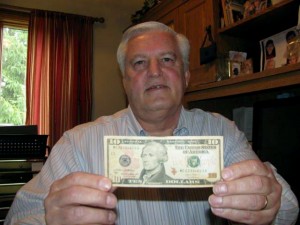
Doug Hamilton is just fine with plans to put a woman’s portrait on U.S. paper money, but he’d prefer that the Treasury Department leave the $10 bill alone — particularly the prominent visage of his great-great-great-great-great grandfather, Alexander Hamilton.
The 10-spot is a source of family pride in Hamilton’s house in suburban Columbus, a dignified symbol of the historical importance of his ancestor, whose picture has been on it since 1929. So naturally, Hamilton started making some noise when he heard about the proposal that has Alexander Hamilton sharing the note with a deserving woman yet to be chosen.
The 64-year-old salesman for IBM has joined a growing number of voices in a backlash against what he calls the “diminishing” of Hamilton, the first secretary of the Treasury who founded the nation’s banking system.
“He’s the father of paper money,” says Doug Hamilton, who has a son and grandson carrying the name of their famous ancestor. (His daughter, Elizabeth, was named for Alexander Hamilton’s wife.)
He’s urging people to sign a petition on the White House “We The People” website, and this weekend he’ll be preaching the Hamiltonian gospel at a series of annual events in New York and New Jersey planned around the anniversary of Alexander Hamilton’s death on July 12, 1804, a day after his duel with Aaron Burr.
The trip also will include a preview of the hip-hop musical “Hamilton,” based on Ron Chernow’s biography of Alexander Hamilton, opening on Broadway.
Outcry over Hamilton’s possible demotion has been somewhat lost in the wave of excitement over the inclusion of a woman’s portrait on paper currency. The Treasury Department says the $10 bill was chosen because it’s up next for a redesign to improve anti-counterfeiting features. The new bill would go into circulation in 2020.
Treasury Secretary Jacob Lew said this week that he’s sticking with the plan, despite critics arguing that a woman should be featured on the $20 bill in place of Andrew Jackson, whom many historians view less favorably because of his treatment of Native Americans and his ownership of slaves.
“Right now is the time to call that out,” says Barbara Howard, founder of the group Women on 20s, which advocates replacing Jackson with a deserving woman from history. Doug Hamilton has joined forces with Howard’s group and others trying to change Lew’s mind.
Meanwhile, former Federal Reserve chairman Ben Bernanke wrote in a blog that he was “appalled” at the idea of adding a woman to the $10 bill at Hamilton’s expense. The New York Times wrote in a Fourth of July editorial that it’s a much better idea to bump Jackson, an undistinguished president who, ironically, hated the idea of paper currency.
“The announcement has really befuddled people,” says Rand Scholet, president of a group called The Alexander Hamilton Awareness Society, which planned some of the events this weekend expected to draw hundreds.
According to the Treasury Department, putting Hamilton’s portrait on the $10 bill was included in the changes made by the government “to restore faith in economic power of the United States and currency” after the economic crash of 1929 and into the Great Depression.
Doug Hamilton has known since he was a kid that he was related to the founding father. His grandmother first told him, and he confirmed it later through genealogical studies. But all that aside, he says his ancestor’s towering achievements have earned him a permanent place on the bill, and the picture should remain untouched.
“We think,” Doug Hamilton says, “he is somebody the younger generation should look up to.”




